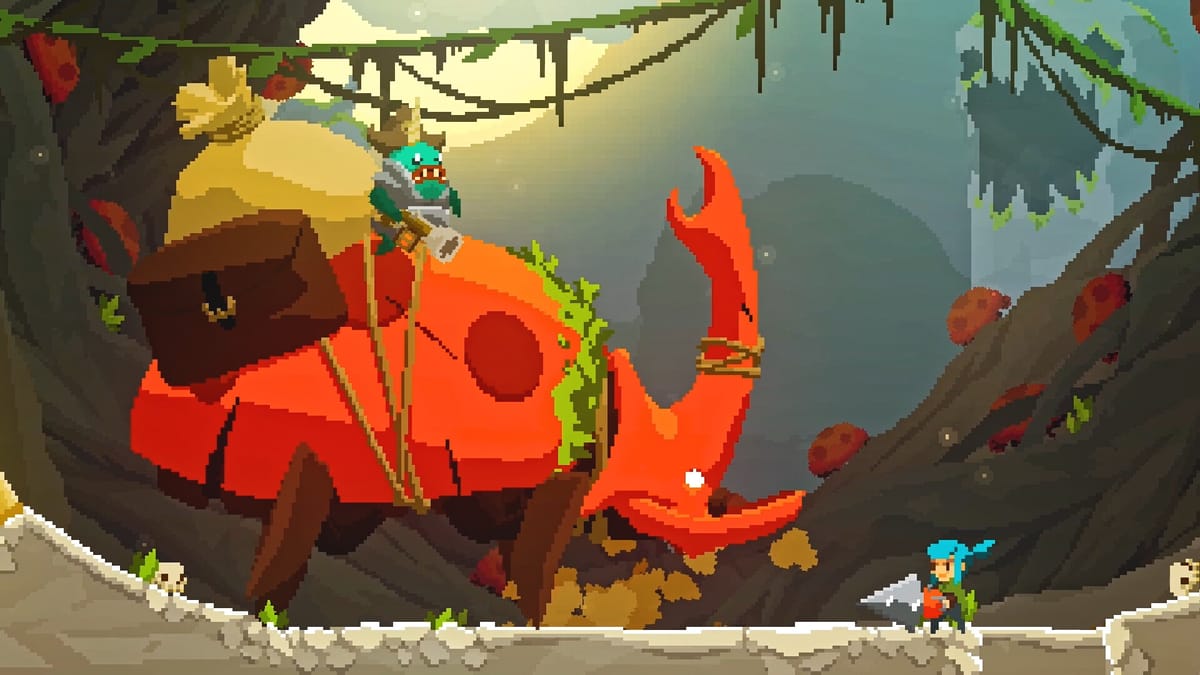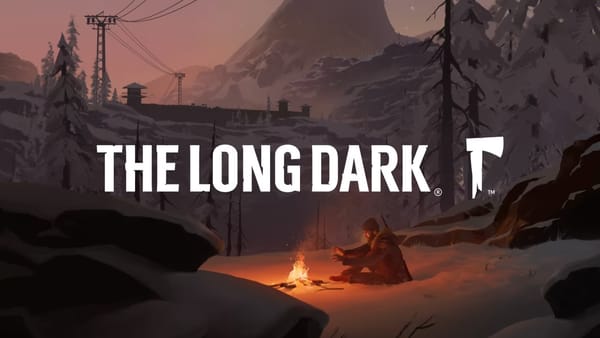On difficulty spikes
A sudden feeling of unfairness

I played Pepper Grinder while recovering from what turned out to be the flu. I’d gotten it on sale, and, quarantined in our guest room while I got over whatever the hell was going on with me, I decided to boot it up on my Steam Deck, which alongside my laptop was my sole friend during this period. Pepper Grinder, a platformer where you have a drill that lets you dig through elements of the levels, propelling you forward like a kind of missile or dolphin, is pretty easy.
And that’s fine. I like easy games. They get a bad rap, as though challenge, by itself, is an essential element of the medium. Maybe it is for some games, but we can’t apply that metric to every title. Just as there is satisfaction inherent to finally triumphing over something you thought impossible, there is a different (but not lesser) satisfaction in an easily accomplished task. Put another way, the opening stages of Super Mario Bros. Wonder are not less satisfying than the final challenge stages. They’re just a different kind of satisfying. A game can start easy, be fun, then grow difficult, and still be fun.
It’s when the difficulty jumps unexpectedly that we, as players, tend to respond negatively.
“Difficulty spikes,” as a concept, are unique to the medium of games. Insofar as I can tell, nobody has ever complained that a book had an unnecessary increase in diction in the latter half of a novel. Or that a movie grew a lot more tiresome to watch because it employed much more challenging… uh. Colors? Cinematography? I don’t know. Point being, the idea that difficulty is something to be tracked by the creator of a game much in the same way that plotting might need to be tracked by a novelist is in itself interesting, I think. It is an essential element of this medium of creative output, and it must be carefully considered.
To return to Super Mario Bros. Wonder: This is clearly a game that has thought about difficulty on a fundamental level. Why? Easy: its audience. Nintendo has the somewhat unique obligation to satisfy both a novice audience (children getting into videogames) and an expert audience (people who were once children getting into videogames). Their solution in recent years has been to frontload their games with all the easy stuff and backload them with all the (optional) hard stuff. Mark Brown over at Game Maker’s Toolkit laid it out much more thoughtfully than me in the excellent video essay “Super Mario’s Invisible Difficulty Settings.” It’s a brilliant system, as Brown argues, because it doesn’t announce itself via a rigid difficulty select screen. Instead, it slowly acclimates the player to its increasing demands on their ability. The trick it pulls off is one of incrementalism: of starting the player in the shallow end then goading them, over time, into the deep. There’s nothing wrong with a game getting more difficult. It’s only when we’re shunted from the wading pool to the ocean’s depths that we react with displeasure.
Pepper Grinder is very easy until you get to one of its bosses, and then it is decidedly less so. We’re not talking Dark Souls level difficulty here—they are ultimately beatable—but it’s not a matter of degree so much as it is a matter of comparison. Stages leading up to the bosses are largely a breeze, excepting a few tricky platforming sections sprinkled here and there. Even those are fairly easily surpassed, and if not, a generous checkpoint system keeps you close to the point of failure.
The bosses, however, require you to beat them in one fell swoop and require significantly more precision and mastery over the controls than anything else in the game. This is especially true of the game’s final boss, which had my palms sweating to the point where I had to do the thing where you swear at your console as you wipe your hands on your pants. I beat it eventually, but not after ruminating over just how much more difficult it was than the rest of the game, and why, exactly, did that make me feel so negatively toward the game.
A similar feeling arose in me at the very end of Metaphor: ReFantazio, which, unlike Pepper Grinder, I did not finish. Despite maxing out all my social bonds and doing every optional side dungeon, I was, apparently, underleveled for the final boss. That would be fine if the game didn’t operate under a limited timeframe, disallowing grinding, unless, I guess, I chose to fuck around and smash up a bunch of baddies in the area leading up to the final boss. There were no Metal Slimes to farm here. Just a series of enemies that I was easily dispatching, offering no indication that I should be kicking their asses indefinitely in order to stand a chance against the big bad.
Frustrated after some cheap one-hit kills (and, frankly, by a one-note finale that I don’t think lives up to the game’s lofty narrative ambitions), I quit and watched the ending on YouTube. It’s been a long time since I did something like that, but life is short, and I’d soured on the game in a way that didn’t feel pleasurable to push through. It had hit me with a difficulty spike in its waning hours, and my patience for such a thing 80 hours in was nil.
I think what’s frustrating about difficulty spikes is that they’re too much like life. In his excellent essay “All Work and No Play” in Dissent, Sam Adler-Bell argues that often games don’t offer an escape from our working lives, but rather a more fair facsimile of the very systems we navigate in our day-to-day:
Single-player games with plenty of weapons to upgrade, skills to gain, and currencies to spend are perhaps the archetypal iteration of this phenomenon, but almost all contemporary games contain some mimetic elements of work and market exchange. They don’t offer fantasies of escape, of imaginative play for its own sake; they offer a fantasy of rules—a rationality otherwise missing from the contemporary wage labor process. Vicky Osterweil has called this type of game a “utopian work simulator”; it doles out rewards at predictable intervals in exchange for our disciplined effort. These rewards can make the game easier, allow us to purchase in-game adornments, signal our achievements to others, and progress in a logical and satisfying trajectory toward an achievable goal. Games remain a form of diversion, but what they divert us from is not our labor, but our disappointment with its volatility, its arbitrariness, its cruelty and unfairness.
If a game is a simulation of meritocracy, of the idea that we are succeeding because we are inherently good at what we do and because we have put in the time, a difficulty spike represents a harsh puncturing of that illusion, which is to say, a return to reality. You may feel that you are doing well at your job, and in fact you may be, only to find out the next day that you have been laid off due to forces outside your control. Conversely, you may find that someone who is demonstrably lazy, or ineffectual, or (perhaps worse?) clueless finds themselves climbing the ladder, while you, diligently attending to every need which comes your way, stay right where you are, with no hope of ascension in sight. (In either scenario, you should instead choose to view your colleague as your comrade and direct your anger elsewhere, if you catch my drift.)
Difficulty spikes are then the manifestation of this very dispiriting and yet commonplace occurrence: that good things do not always happen to good people. That dreams do not always come true. Games, in simulating systems of achievement, provide a calming panacea wherein the rules of a given thing can be understood, mastered, and triumphed over. Difficulty spikes communicate the opposite: that, for all your rules, you can still be humbled by something outside of your control.
After beating Pepper Grinder when I was sick, I impulse purchased the Dragon Quest III remake. I wanted videogame comfort food, and by god, I got it. The only thing so far resembling a difficulty spike here is the ability to choose a new class, resetting your level to 1 while retaining half of your stats and all of your abilities. But you get to choose it, meaning that it is not a difficulty spike so much as it is the voluntary taking on of new responsibilities. It is embarking on something new, knowing that it is new. More than this, it is quickly overcome, as additional levels come quickly, and the ability to travel to portions of the map with easier enemies is freely available by that point. It is the freedom to start again. The freedom to choose the difficulty of beginning again.
Perhaps there will come a time when I will be faced with a difficulty spike in Dragon Quest III as well. Lord knows the final boss of Dragon Quest XI was a big jump. Maybe, like XI, I’ll grind out the end of III to get over that hump. Or maybe, like Metaphor, I’ll simply stop playing. Or maybe I’ll take a different approach and choose not to finish at all. To live in the middle of the game, where the fantasy of meritocracy has not yet been punctured. Yes, that sounds nice. That sounds like a good diversion. That sounds like what I want.
Hey, folks. Grayson here. Some housekeeping here at the end:
- As you might’ve noticed, this was a long one and a bit differently structured than other Backlogs. This is because I am changing Backlog to a monthly newsletter as opposed to a biweekly one. I’ve taken on some extra responsibility this year, with a promotion at work, a novel in revision phase, and writing two pieces for Polygon each month (more on that below). In short, I just don’t have the time to do two pieces per month, or to play that many games. But what I do have is the desire to reflect on each month of gaming that I do this year with a broader lens, focusing on a topic rather than a game. This is my first stab at that idea, and I hope you like it. As always, let me know your thoughts in the comments.
- Alongside this, I’ve decided to stop accepting paid subscriptions to Backlog. Thank you to those who have supported this work over the last almost three years. I am forever grateful for your belief in my writing and this newsletter. That being said, I feel more comfortable going forward with this project if it is being given for free in its entirety. That way, if I’m late one month, I won’t feel as though I’ve taken advantage of someone’s generosity. This change, I think, will free me to simply focus on quality instead of cadence.
- Speaking of cadence, I will also share with folks my two Polygon pieces each month in the postscript section like this. In January, I wrote about the snack-sized bullet-heaven Rocket Rats and the oft overlooked The Beginner’s Guide. If you find yourself missing the bimonthly Backlog, I hope you’ll enjoy my pieces over at Polygon. I’m proud to have reached the point where I have two monthly columns over there, so I hope you’ll wish me luck in keeping that up this year.
- Finally, should folks want to contribute to the hosting costs and paid guest posts on Backlog, I will offer an option to “tip,” which they recently added to Ghost. See the button below if you are such a person!
- That’s it! See you all in March.





